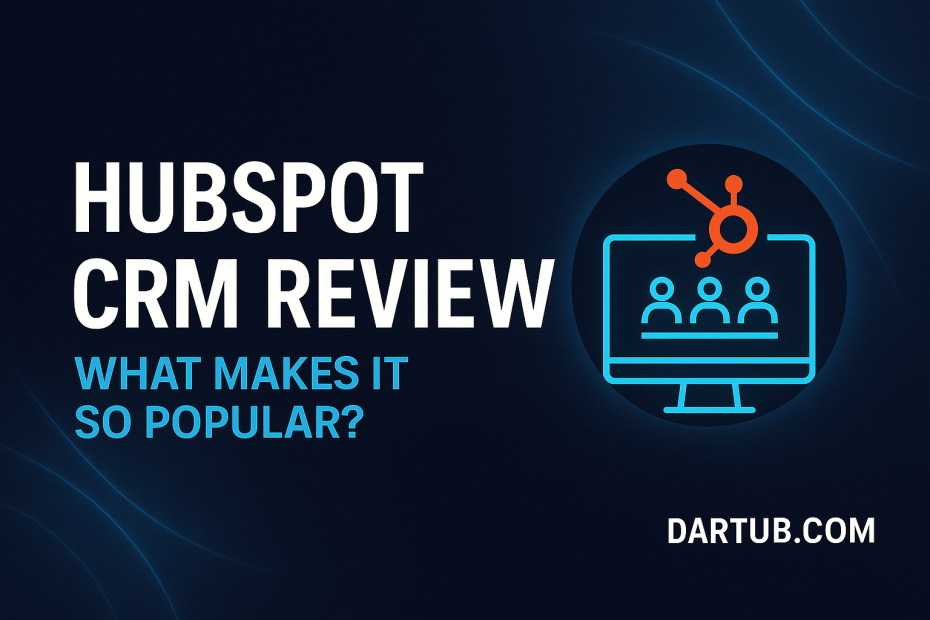When it comes to customer relationship management (CRM) software, HubSpot CRM is often the first name that comes to mind — and for good reason. It’s intuitive, robust, and, most notably, free to start. But with dozens of CRM tools on the market, what exactly makes HubSpot CRM so popular?
In this in-depth 2025 review, we’ll break down HubSpot CRM’s features, pros, cons, pricing, real-world use cases, and how it stacks up against other platforms. If you’re looking for a CRM that aligns with your sales, marketing, and service goals, this guide is for you.
What Is HubSpot CRM?
HubSpot CRM is a cloud-based customer relationship management platform that helps businesses manage leads, track customer interactions, automate marketing efforts, and streamline sales pipelines. Launched in 2014 by HubSpot Inc., it has evolved into an all-in-one suite that integrates sales, marketing, customer service, and operations tools.
Key Features of HubSpot CRM
1. Contact & Lead Management
Easily store and organize detailed contact profiles, track interactions, and assign lifecycle stages. Each profile includes:
- Communication history
- Notes and tasks
- Activity tracking (emails, calls, meetings)
2. Sales Pipeline & Deal Tracking
Visualize and manage your entire sales process with a drag-and-drop pipeline. You can:
- Create custom deal stages
- Assign tasks and reps
- Forecast revenue
3. Marketing Tools Integration
Use HubSpot’s marketing hub to:
- Build landing pages
- Automate email campaigns
- Capture leads with forms and CTAs
4. Email & Calendar Integration
Sync with Gmail, Outlook, and other platforms to:
- Send tracked emails
- Schedule meetings
- Receive real-time notifications
5. Reporting & Analytics
Dashboards provide insights on:
- Sales performance
- Marketing conversions
- Deal forecasting
6. Free Tools & Scalability
HubSpot CRM is free to start, with premium upgrades available. Even the free tier includes:
- Unlimited users
- Contact management
- Live chat and chatbot
Who Should Use HubSpot CRM?
HubSpot CRM works for:
- Small Businesses: Start with a free, scalable tool
- Freelancers & Solopreneurs: Track clients and automate outreach
- Sales Teams: Manage deals, pipelines, and team collaboration
- Marketing Agencies: Integrate with campaigns, landing pages, and email tools
HubSpot CRM Pricing Breakdown (2025)
Free Plan
- Unlimited users and contacts
- Email marketing, forms, landing pages
- Deal pipelines and basic automation
Starter (From $20/month)
- Email automation
- Custom properties
- Support from HubSpot
Professional (From $800/month)
- Advanced reporting and workflows
- Sales forecasting and automation
- Teams and hierarchical management
Enterprise (From $3,600/month)
- Custom objects
- Predictive lead scoring
- Dedicated support and analytics
Pros of HubSpot CRM
- User-Friendly Interface: Minimal learning curve
- Robust Free Plan: More than most CRMs offer without payment
- Integrated Ecosystem: Works with HubSpot Marketing, Sales, Service, and CMS
- Powerful Automation: Even in lower tiers
- Third-Party Integrations: Works with tools like Slack, Zapier, and Salesforce
Cons of HubSpot CRM
- Can Get Expensive at higher tiers
- Limited Customization in the free and starter plans
- Steep Price Jumps between tiers
- Complex Features may overwhelm small teams
Real-World Applications and Success Stories
Case Study 1: B2B Tech Startup
A growing tech startup used HubSpot CRM’s free tier to streamline sales outreach, boosting lead conversion by 35% in 6 months.
Case Study 2: Freelance Digital Marketer
Used HubSpot’s marketing tools to build email sequences and landing pages — with a 2X boost in client inquiries.
Case Study 3: SaaS Company
Scaled from 5 to 50 employees using HubSpot’s Pro plan for managing sales reps, forecasting, and automation.
HubSpot CRM vs. Other Platforms
vs. Salesforce
- Salesforce is more customizable but complex
- HubSpot is easier to use and has a better free version
vs. Zoho CRM
- Zoho is cheaper, but HubSpot offers a better UI and automation
vs. Pipedrive
- Pipedrive is sales-focused, HubSpot has better all-in-one features
Final Verdict: Is HubSpot CRM Worth It?
If you’re a small business, freelancer, or mid-sized company looking for a scalable CRM that’s easy to use, HubSpot CRM is hard to beat — especially with its free plan. As you grow, you can unlock more powerful tools through its paid tiers.
Yes, it gets expensive at scale, but for many, the ROI in time saved, deals closed, and customer engagement makes it well worth the price.
